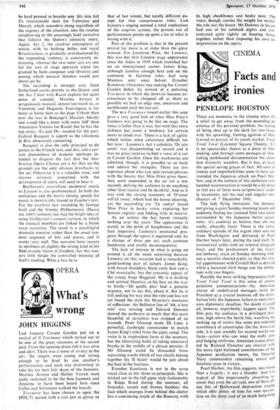What's wrong
JOHN HIGGINS
Last January Covent Garden put on a revival of ll- Trovatore which turned out to be one of the great successes of the season past. From the opening drum roll it was alive and alert. There was a sense of rivalry in the air: the singers were young and strong enough to be fired by one another's performances and each was determined to take his (or her) fair share of the honours. Martina Arroyo and Shirley Verrett were justly reckoned to be the best Leonora and Azucena to have been heard here since Callas and Simionato walked the boards.
Trovatore has been chosen to open the 1970/71 season with a cast just as glossy as
that of last winter, but totally different ex- cept for two comprimario roles. Last January's singing seemed a total vindication of the stagione system; the present run of performances points up quite a lot of what is wrong with it.
Part of the problem is that in the present revival far more is at stake than the gipsy woman. For Leontyne Price, the Leonora, this was her first London stage appearance since the Aidas in 1959 which launched her on an international career. James King, although familiar enough here and on the continent in German roles, had sung Manrico only once before. Erzsebet Komlossy (Azucena) was making her Covent Garden debut. So instead of a pulsating Trovatore in which the intervals become ex- crescences to be chopped off as short as possible we had an edgy one, uncertain and earthbound until the last act.
The RCA Trovatore issued earlier this year gave a very good hint of what Miss Price's Leonora was going to be like on stage. The voice is fuller than it was, but with this extra richness has come a tendency for certain notes to cloud over. There is a lack of agility which makes some coloratura difficult for her now: Leonora's Act i cabaletta `Di tale amor' was disappointing on record and it was no great surprise to find a verse of it cut at Covent Garden. Once the weaknesses are admitted, though, it is possible to sit back and admire the strengths. There are few sopranos about who can spin certain phrases with the beauty that Miss Price gives them; they seem suspended in the air for a few seconds, defying the audience to do anything other than rejoice and be thankful. And so it was with the closing moments of "D'amor sull'ali rosee', which had the house cheering, yet the succeeding cry `Tu vedrai' found Miss Price in husky voice, exploring her bottom register and finding little in reserve.
As an actress she has learnt virtually nothing over the years. The appearance is stately to the point of haughtiness and the face impassive. Leonora's emotional pro- gress through the opera is registered only by a change of dress per act, each costume handsome and totally inconsequential.
The lack of interest in what is going on around is all the more surprising because Leonora on this occasion had a remarkably good-looking pair of suitors. James King, with broad shoulders, black curly hair and a Che moustache, has the romantic appeal of the young Serge Reggiani. He is a dashing and spirited Manrico, at his best on the way to battle—`Di quella pira' had a genuine urgency, not to say fire, about it. But he is still seeking his way into the role and has not yet found the style for Manrico's moments of reflection : the Bellinian line of `Ah, si ben mio' was missing and Edward Downes slowed the orchestra so much that this most beautiful of cavatinas was stripped of its warmth. Peter Glossop. made Di Luna a powerful, forthright commander to match James King's rebel from the gipsy camp. The voice is in resplendent form at the moment, but the infuriating habit of taking unnatural breaks in the middle of a phrase persists; if Mr Glossop could be dissuaded from separating words which all too clearly belong together his '11 balen' would be just about the best in the business.
Erzsebet Komlossy is not in the same vocal class as her three co-principals. She is tricked out in the full gipsy style fashionable in Kings Road during the summer, all brocades, tassels and bronze baubles; the face which emerges from behind this clutter has a convincing touch of the Romany with
its high cheekbones and beaky nose. The voice, though, carries the weight for neither the role nor the house. Mr Downes in the pit had one of his subdued nights and con- centrated quite rightly on keeping things together rather than imposing his own in- terpretation on the opera.






































 Previous page
Previous page